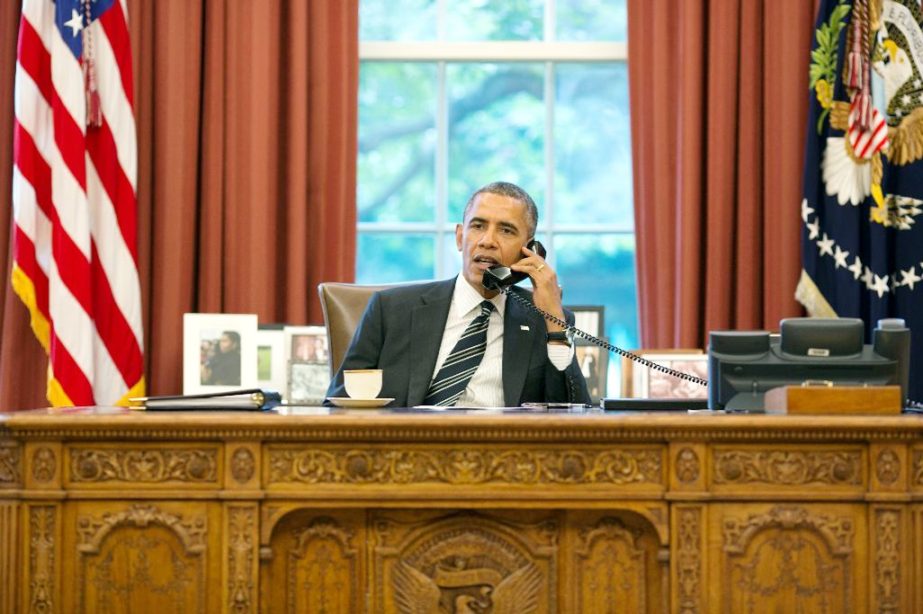
AFP, Washington :
Signed with pomp and fanfare on July 14, 2015, the Iranian nuclear agreement was heralded as a triumph for American diplomacy and international cooperation on nonproliferation.
Two years later, it has few friends in the Trump administration or in Tehran.
When it was signed in Vienna, President Barack Obama and his secretary of state, John Kerry, claimed the pact-commonly known as JCPOA, for Joint Comprehensive Plan of Action-as an undeniable success.
Their Iranian counterparts, President Hassan Rouhani and Foreign Minister Mohammad Javad Zarif, were equally ebullient. The pact was also signed by China, Russia, France, Britain and Germany, lending it additional weight.
In force since January 16, 2016, the JCPOA provides for international monitoring of Tehran’s nuclear program to ensure its purely peaceful, civilian use.
In exchange, Tehran was promised the gradual lifting of the international sanctions that have strangled the Iranian economy for years. But during his presidential campaign, billionaire Republican Donald Trump made the accord a favorite target. In campaign speech after campaign speech, he pronounced it “the worst deal ever,” and he vowed, if elected, to “rip it up.”
As president, however, Trump has not carried out his threat.
In May, the Trump administration even decided to pursue the Obama policy of easing some sanctions at least while completing a JCPOA review to decide-in principle by Monday-whether to continue lifting sanctions.
After vowing to drop out of the Paris climate agreement and questioning the Obama-era opening to Cuba, Trump would be dealing a terrible blow to his predecessor’s legacy if he decided to abandon the JCPOA.
The former real estate mogul has already staked out contrary positions to Obama in the Middle East, tightening US ties to Saudi Arabia’s Sunni leaders while calling for the “isolation” of their Shiite rivals in Iran.
Washington accuses Tehran of posing a regional “threat” that “destabilizes” Syria, Iraq, Yemen and Lebanon, either directly or through its “terrorist” proxies.
Signed with pomp and fanfare on July 14, 2015, the Iranian nuclear agreement was heralded as a triumph for American diplomacy and international cooperation on nonproliferation.
Two years later, it has few friends in the Trump administration or in Tehran.
When it was signed in Vienna, President Barack Obama and his secretary of state, John Kerry, claimed the pact-commonly known as JCPOA, for Joint Comprehensive Plan of Action-as an undeniable success.
Their Iranian counterparts, President Hassan Rouhani and Foreign Minister Mohammad Javad Zarif, were equally ebullient. The pact was also signed by China, Russia, France, Britain and Germany, lending it additional weight.
In force since January 16, 2016, the JCPOA provides for international monitoring of Tehran’s nuclear program to ensure its purely peaceful, civilian use.
In exchange, Tehran was promised the gradual lifting of the international sanctions that have strangled the Iranian economy for years. But during his presidential campaign, billionaire Republican Donald Trump made the accord a favorite target. In campaign speech after campaign speech, he pronounced it “the worst deal ever,” and he vowed, if elected, to “rip it up.”
As president, however, Trump has not carried out his threat.
In May, the Trump administration even decided to pursue the Obama policy of easing some sanctions at least while completing a JCPOA review to decide-in principle by Monday-whether to continue lifting sanctions.
After vowing to drop out of the Paris climate agreement and questioning the Obama-era opening to Cuba, Trump would be dealing a terrible blow to his predecessor’s legacy if he decided to abandon the JCPOA.
The former real estate mogul has already staked out contrary positions to Obama in the Middle East, tightening US ties to Saudi Arabia’s Sunni leaders while calling for the “isolation” of their Shiite rivals in Iran.
Washington accuses Tehran of posing a regional “threat” that “destabilizes” Syria, Iraq, Yemen and Lebanon, either directly or through its “terrorist” proxies.

